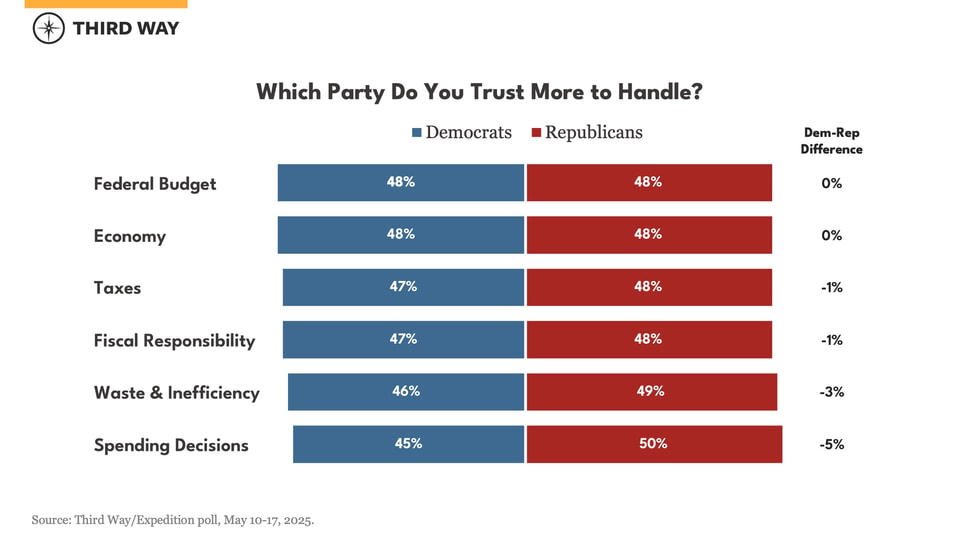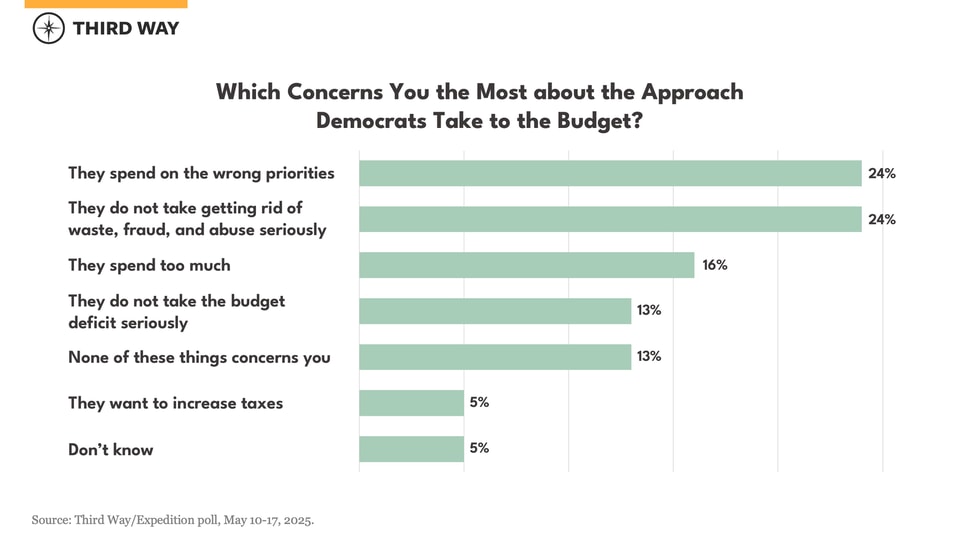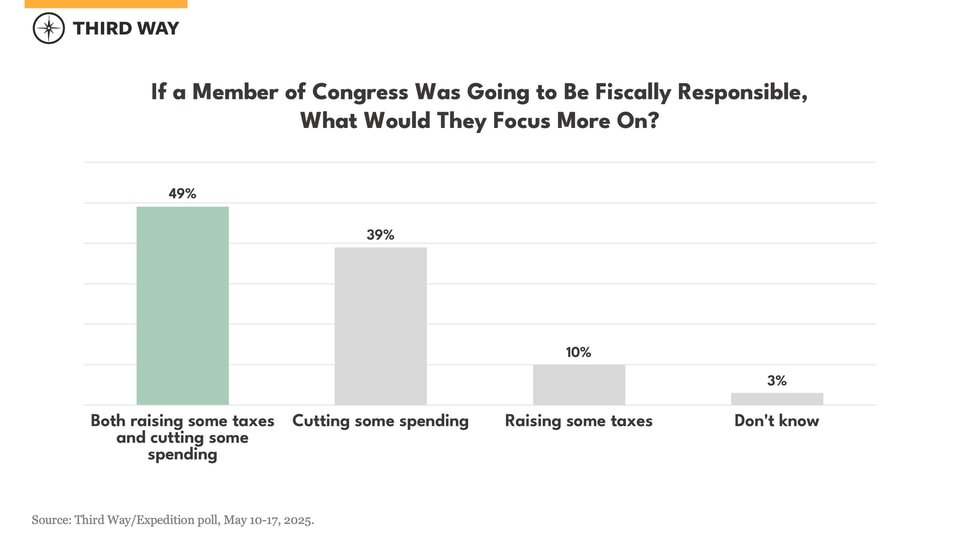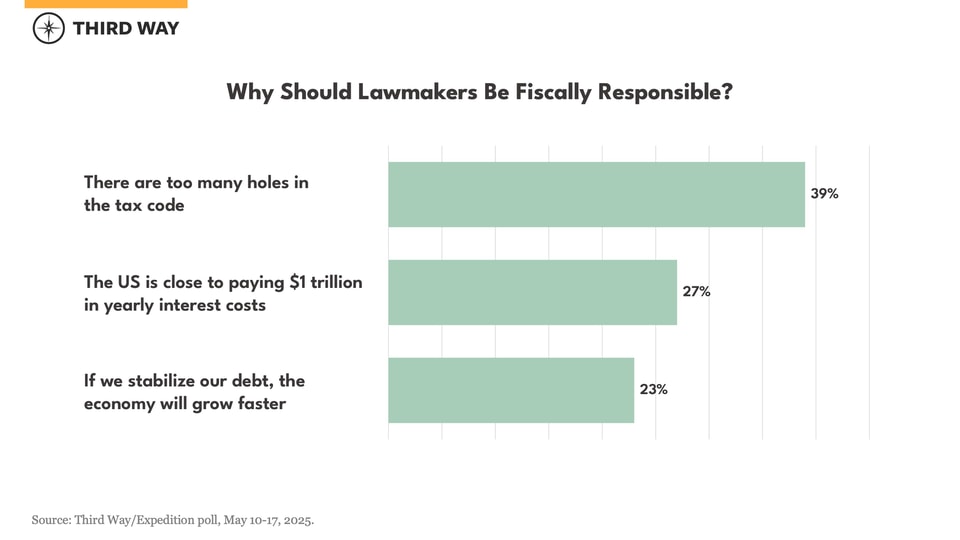Memo Published June 12, 2025 · 9 minute read
Detonating the Debt Bomb: Messaging Advice for Reconciliation
Gabe Horwitz & Zach Moller

Democrats have a new opportunity to go on offense over fiscal responsibility and the economy—just as Republicans are adding trillions to the national debt, slashing people’s health care, and shoveling tax breaks to those at the very top.
We worked with Expedition Strategies to field focus groups and a poll of 2,000 likely voters from five 2026 Senate battleground states (Georgia, Maine, Michigan, New Hampshire, and North Carolina).
We found that Trump and Republicans are fumbling key issues as voters lose confidence in the economy, reel from tariffs, and fear for a recession. But Republican losses have not translated into Democratic gains. With the Republican tax package and the Trump tariffs now occupying center stage, Democrats can drive public sentiment with a simple message: The Trump plan will bankrupt us. It will bankrupt America with trillions in dangerous new debt. It will bankrupt Americans with expensive new tariffs that drive up costs. And it will slash people’s health coverage, which could cost them their savings and their lives.
Below, we summarize voter sentiment on the economy and fiscal issues, and we provide a series of actionable messaging strategies on how Democrats can detonate the GOP’s debt bomb during reconciliation.
What Voters Feel
Voters are down on the economy, have little faith in Trump’s economic plan, dislike tariffs, and believe both parties are fiscally irresponsible. They believe Democrats are wasteful spenders, unwilling to make tough choices, and have no coherent economic strategy. Voters’ thirst for fiscal responsibility is not simply about exploding budget deficits. They want government to prioritize the right spending, have a budget that plans for the future and protects the middle class, cut spending intelligently, and raise taxes and close loopholes on the wealthy and large corporations.
Economy is still top of mind—as is a recession. In an open-ended question, voters overwhelmingly want Congress to focus on the economy, which was ranked over two times higher as the second-place issues (21% to 9% for government reform and 9% for immigration). Part of that focus stems from recession fears. Two-thirds of voters say we are either currently in a recession (17%) or are headed toward one (51%).

Republicans are facing headwinds on the economy and budget. President Trump’s job approval rating is underwater in general (59% fair/poor, 41% excellent/good) as well as on the economy (20 points underwater) and the federal budget (21 points underwater). Voters also distrust Republicans in Congress on the federal budget (42% trust, 57% not trust) and the economy in general (48% trust, 52% not trust).
Despite GOP issues, Democrats are not capitalizing. Amid DOGE dysfunction, tariffs, and economic chaos, Democrats don’t have any advantage in voters’ eyes on the budget, the economy, taxes, or fiscal responsibility. Republicans even have a three-point advantage on fighting waste and a five-point advantage on spending.

Democrats have a serious brand problem on spending. When voters were asked what concerns them about the approach Democrats take on the budget, 24% said they spend on the wrong priorities. Another 24% said they don’t take waste, fraud, and abuse seriously, and 16% said they spend too much. That means almost two-thirds of voters have concerns with Democratic spending.

Fiscal responsibility and accountability are priorities for voters. Sixty-seven percent of voters don’t think the federal budget is being handled responsibly. However, voters overwhelmingly feel that having a fiscally responsible candidate for federal office is important (83% very important, 15% somewhat important). Similarly, when asked what attitude they want their elected official to have on budget issues, their top response was accountability.
Voters prioritize fiscal balance. Almost half of voters (49%) think that if a Member of Congress was going to be fiscally responsible, they would both raise some taxes and cut some spending to deal with the federal deficit. Thirty-nine percent say they would just focus on cutting spending, and 10% say they would just raise taxes. To put that into perspective, 88% of voters believe spending cuts are a prerequisite for fiscal responsibility. Requiring tax cuts to be paid for with an equal amount of spending cuts or other tax increases is also widely seen as fiscally responsible (64% total responsible, 34% very responsible).

Voters believe fiscal responsibility will make the economy stronger and fairer. The top reason that voters say lawmakers should be fiscally responsible is that there are too many holes in the tax code that allow some people and companies to avoid paying their fair share (39%). This was followed by the fact that interest on the debt is costing the United States nearly $1 trillion a year (27%) and the notion that if we stabilize our debt, the economy will grow faster (23%).

Voters want to take a paring knife, not a chainsaw, to spending. Voters associate some smart, future-oriented policy as fiscally responsible. Namely, financial incentives to companies who manufacture in the United States (76%), cutting taxes for the middle class (70%), and expanding Medicaid (59%) were seen as fiscally responsible. At the same time, when asked how a Democratic candidate might show they are serious about fiscal responsibility, two things stood out: changing the tax code so the wealthy and profitable major companies pay more in taxes (25%) and eliminating waste and fraud in government (23%). Independents also prioritized reducing the size of government spending (21%).
Not all cuts are smart cuts. A majority of voters support the goals of DOGE (53% to 45%), but a majority also don’t think it is being executed well (43% to 56%). A majority of voters say cutting IRS staff (52%), maintaining higher tariffs on foreign countries (55%), and removing federal Inspectors General who fight waste and fraud (66%) are all fiscally irresponsible actions. Cutting taxes for the wealthy was also seen as highly irresponsible (72%).
Tradeoffs make a nod to deficit reduction. If the government were going to raise people’s taxes by $100 a year, the clear preference for how that money should be spent is reducing the national deficit (42%), with scientific and medical research as a distant second (16%).
How Democrats Can Detonate the GOP Debt Bomb
As reconciliation makes its way through Congress and tariff threats dominate coverage, a messaging battle has emerged. Republicans will win if the prevailing narrative is about a middle-class tax cut to grow the economy. But Democrats have a stronger and more believable counternarrative: Trump will bankrupt us. He will bankrupt America by exploding the deficit and bankrupt American households by exploding costs, slashing health care, and driving the nation into a recession.
Democrats can win the narrative battle by leaning into fiscal responsibility, which also represents a break from the same old Democratic brand of tax and spend. Here are eight actionable ways to drive the narrative that Trump will bankrupt us:
- Call out the Republican debt bomb. Donald Trump is the self-proclaimed “King of Debt” who has gone bankrupt multiple times. Republican Senator Ron Johnson has decried the Trump “debt bomb.” Elon Musk has called it a “disgusting abomination.” Bond traders are in a panic over America’s exploding debt. The debt isn’t always top of mind but, at the moment, it is—especially for Main Street and Wall Street. Focusing on how Republicans are adding trillions of dollars to the national debt takes ground from the GOP.
- Use the B word. Trump’s Big Beautiful Bill will bankrupt The House-passed bill adds $2.4 trillion of new debt on top of the trillions in deficit spending we were already facing. Interest rates are rising which puts financial strain on every family and business. The spending cuts seem intent on inflicting the most financial harm possible on working-class families. America is already struggling to sell treasury bonds.
- Break the status quo on spending. Voters already know we want to raise taxes on the rich. To be taken more seriously with voters outside the base, they need to see examples of Democrats eliminating waste in government and ideally reducing the size of government spending. Democrats should go after Republicans for removing Inspectors General who root out waste and fraud, as well as cutting IRS staff who go after tax cheats. But going after the GOP alone is not sufficient—Democrats must demonstrate ways in which they believe spending can be cut.
- Be balanced when it comes to fiscal responsibility. A sole focus on making the rich pay their taxes is not enough to be fiscally responsible. Neither is the GOP view that thinks fiscal responsibility lies only in spending cuts and not revenue. Voters know we have to fix our tax system and confront wasteful spending.
- Don’t let Trump & the GOP off the hook. Billionaires should pay more in taxes. But remember: billionaires are not on the ballot—Trump and the GOP majority are. Voters say that Donald Trump and Republicans in Congress are bigger threats to this country than billionaires (53% to 42%), with Democrats expressing this concern even more emphatically (69% to 28%). Don’t let Trump and the GOP Congress get a pass on exploding deficits, special interest tax breaks for the wealthy, and deep slashes to Medicaid.
- Don’t forget the tariffs. Tariffs are unpopular because they raise costs. They are a tax increase that bankrupts the middle class. Call them out. Reconciliation does nothing to stop tariff price increases. Instead, it explodes the debt, drives us into a recession, and slashes health care from people—bankrupting America and bankrupting Americans.
- Be for middle-class tax cuts. Voters only hear Democrats opposing tax cuts for the rich. But our poll and focus groups found that working- and middle-class voters feel they deserve a tax cut and that cutting taxes for the middle class is fiscally responsible. You should be for middle-class tax cuts and opposed to the rest of the garbage that explodes the debt and takes people’s health care away.
- Fight for the principle that tax cuts are not free. Voters believe tax cuts should be paid for. Period. If Republicans don’t pay for their bill, it means the middle class will be saddled with debt for generations.

